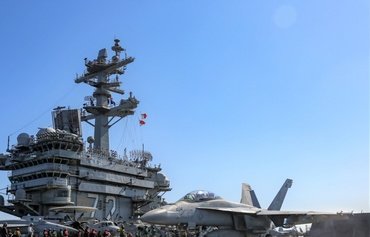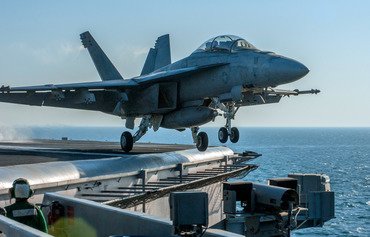The non-military campaign waged by the US and Gulf Co-operation Council (GCC) states against Iran's expansionist foreign policy and its regional proxies has seen tangible results on the ground, experts told Al-Mashareq.
Iran continues to spend enormous sums of money arming its Islamic Revolutionary Guard Corps (IRGC) and its proxies, including Yemen's Houthis (Ansarallah) and Lebanon's Hizbullah, they said.
This investment in its military apparatus and allied forces comes at the expense of its own people, who are facing the fallout from an economic crisis.
In conjunction with several rounds of US sanctions, the GCC, led by Saudi Arabia, has been ramping up the economic and political pressure aimed at reining in Iran's regional agenda, said Bahraini journalist Tamam Abu Safi.
US sanctions target not only Iran’s exports but also the country's banks, and include the designation of a number of Iranian establishments as terrorist entities, she told Al-Mashareq.
These sanctions are having a clear impact on Iran's regional proxies, notably Hizbullah, "which used to receive financial support totaling $700 million annually" from the Islamic republic, she said.
The sanctions also have prevented Iran from directing millions of dollars each year to the Houthis, Abu Safi said.
As for Syria, support from Iran to the Syrian regime has exceeded $15 billion annually, she added, "not including the $2 billion in support that Tehran provides to its affiliated militias fighting in Iraq and Syria".
"The golden days of Iran's militias in Iraq are over," Abu Safi added, noting that Tehran has been forced to reduce the salaries and many of the benefits it previously paid out to militia members across the border in Iraq.
These militias used to be allocated a budget by Iran that covered salaries ranging from $100 to $500 per month, Abu Safi said.
Cuts to military spending
"There is no doubt that this fallout on Iran's proxies abroad was due to the heavy impact of the US sanctions, which forced Iran to cut its military spending in the budget enacted in March by 28%," Abu Safi said.
Since 2006, Iran's military spending has accounted for as much as 52% of its total budget, she said, noting that this is a country "where spending on health and education services does not exceed 26% of its budget".
The sanctions on Iran also "forced a 17% reduction in the budget of the IRGC’s Quds Force", Abu Safi said.
Iran has been very generous in funding its affiliated militias in the region, despite its own steep economic decline, she said, noting that the value of the riyal has fallen drastically against the US dollar, causing inflation to balloon.
"All the money Iran has spent on wars, destabilizing countries, provoking sectarian strife and establishing extremist sectarian militias has long come out of the pocket of the Iranian citizen," Abu Safi said.
The Iranian regime spent these funds on foreign militias "whereas the average income of a family of four in one of its southern provinces (Ahwaz) does not exceed $100 per month", she said.
Undermining Gulf security
GCC member states have set their sights on fighting terrorism and extremism, said Bahraini author and political writer Saad Rashed.
They seek to close ranks on the Iran issue and to take joint decisions aimed at shifting the foreign policy of the Iranian regime, which has been tampering with the region's security and stability, he told Al-Mashareq.
Iran seeks to undermine security in the Gulf, which threatens development and economic growth, he said, noting that "security is a requirement for the inflow of capital".

![An Iranian customer pays with local currency for her purchase at a shop in Tehran on April 24th. [Atta Kenare/AFP]](/cnmi_am/images/2019/06/25/18625-Iran-Tehran-economy-600_384.jpg)







I don't like the internal security situation in Iran. Someone may ask why. Iran is a super power; I think it'll be one in the near future after it possesses nuclear power. Therefore, I don't understand how it could be penetrated like that and its sons and experts are killed without it doing anything to defend its depth.
Reply2 Comment(s)
By Mahmoud Marghani Moussa Any independent, sovereign state has the right to defend its soil and the borders of its sovereignty at air or sea. It has the right to repel any aggressions by others or any attempt to tamper with its territorial waters or airspace. Everyone will agree on this. These words aren’t said to take sides with Iran or others; rather, this is just to say the truth and fend off falsehoods. The story, as you know, is the hegemony of superpowers on small, or what they think are weak, states!! These states would just be silent, give in and accept the status quo and succumb to blackmail, especially if they have resources. In this case, peoples would be denied the riches which God has given them, as they would be passed over to usurpers both voluntarily and forcibly. The result would be poverty, hunger, and deprivation of those who have resources and riches, and the victory would be for the oppressive usurper who doesn’t want to see any other master in the universe. Iran has the right to defend. Iran has the right to repel and topple anyone who approaches, even if they cite excuses and pretexts. Egyptians had said the truth at the time of Tripartite Aggression against Egypt in 1956 when they wrote: Leave my skies for they are burning, and leave my waters for they are drowning. Beware the land for it is lightning
Reply2 Comment(s)